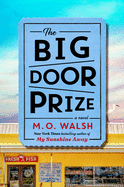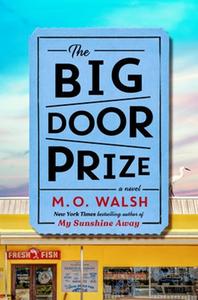
 The Big Door Prize tackles the existential question "Why would you think there's another life for you, perhaps another possibility inside of you already...?" M.O. Walsh (My Sunshine Away) crafts a surprising and heartwarming contemporary drama about looking back and looking forward. A machine, DNAMIX, shows up in a small Louisiana town to reveal "your potential in life, what your body and mind are capable of doing." Walsh clearly understands the tendency for middle-aged people to look in the rearview mirror and second-guess their choices.
The Big Door Prize tackles the existential question "Why would you think there's another life for you, perhaps another possibility inside of you already...?" M.O. Walsh (My Sunshine Away) crafts a surprising and heartwarming contemporary drama about looking back and looking forward. A machine, DNAMIX, shows up in a small Louisiana town to reveal "your potential in life, what your body and mind are capable of doing." Walsh clearly understands the tendency for middle-aged people to look in the rearview mirror and second-guess their choices.
Cherilyn's DNAMIX readout is "Royalty," and she immediately believes the machine sees beyond her housewife exterior. "So many things I've never tried," she cries. Her husband, Douglas, for his part, is reluctant to use the machine. The whole procedure seems laughable, but even so, he acknowledges that he, too, has "hit a wall in his life" and that it's time to "make big-picture changes."
Juxtaposed with adult angst is a sympathetic portrait of the prospects for contemporary teenagers in a world not of their making. Jacob, a high-schooler, grapples with life after the accidental death of his popular twin brother, Toby. Jacob doesn't need a machine to foresee that his future looks desolate. His mother died young, his father is acting like a cowboy after his DNAMIX reading, and there are unsettling rumors about the night of Toby's death. "What could he do to better himself? To move forward? Was that even a thing he wanted?" The turmoil that's often part of teenage experience in the best of times is heightened not only by his family trauma but also by Trina, Toby's girlfriend, who talks of revenge--of blueprints and guns and backpacks. Jacob is drawn into a suspenseful plot that creates unexpected suspense involving the entire town.
The adults in this story have been unwilling and unused to contemplating their life choices, and their discomfort, by turns funny and melancholy, will be familiar to many. Too, Walsh's suggestion that teenagers, closely watching the adults around them, have a deeper and more sophisticated understanding of the compromises they'll make as adults is often painfully accurate. Because each "choice we make today is an extension of, and an opportunity arisen from, the choices we have previously made and will make in the future," readers of this singular, nuanced story will, quite possibly and without a machine as prompt, undertake their own personal reflection. --Cindy Pauldine, bookseller, the river's end bookstore, Oswego, N.Y.
Shelf Talker: Residents in a small Louisiana town deal with the surprising yet heartwarming fallout when a machine reveals what their lives should be instead of what they are.

